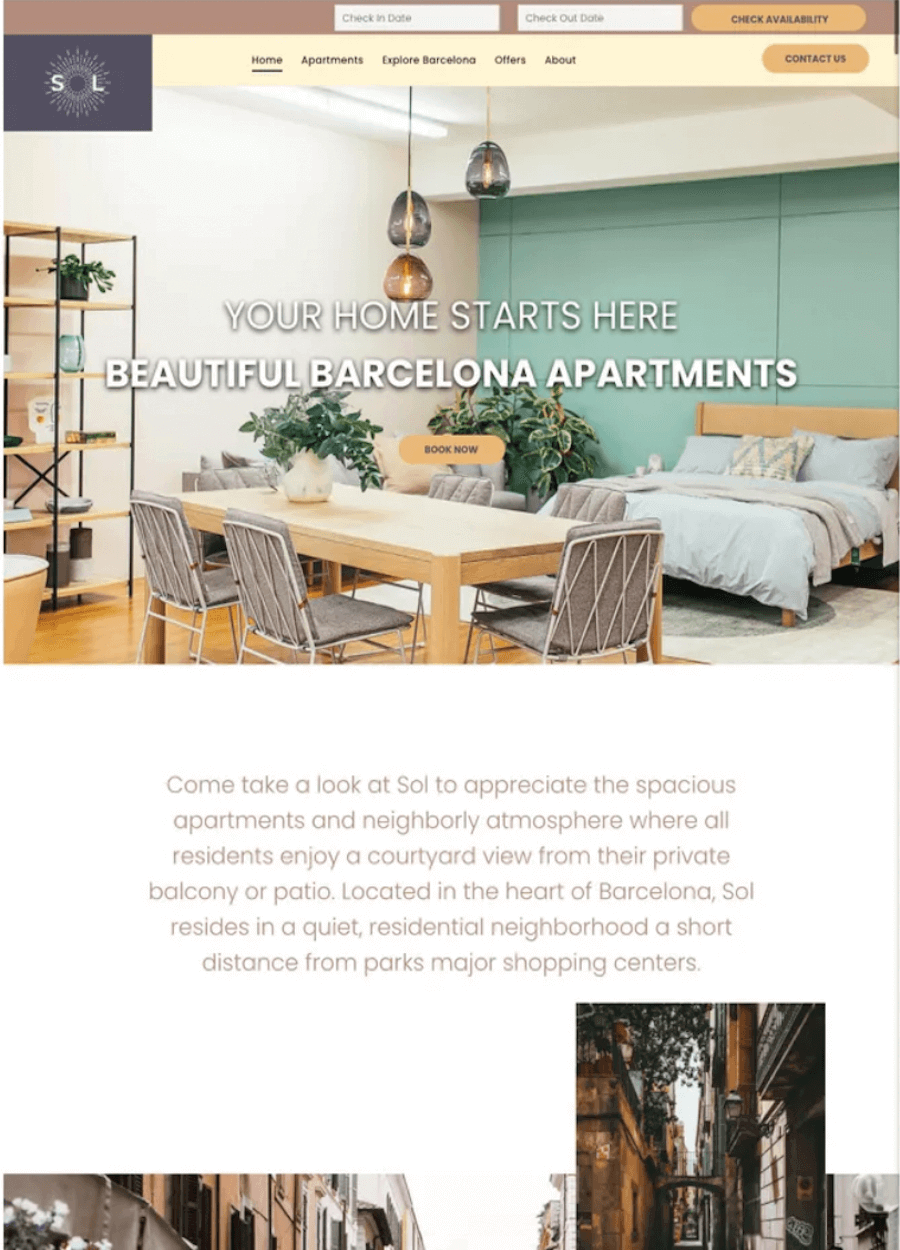Travelers don’t just buy hotel rooms, but invest in experiences. Unlike a new pair of shoes, there’s no return policy if the stay doesn’t measure up. That’s why guests spend hours comparing sites, checking reviews, and scrutinizing every detail before they click “book.”
For hotels, that decision point is everything. OTAs know it; they’ve built slick eCommerce machines designed to capture guests before you can. Thankfully, your website can do the same, and better.
With the right eCommerce strategy, your site stops being a digital brochure and starts acting like your most profitable storefront. In this article, we’ll break down how to showcase value and turn more lookers into direct bookers.
What is hotel eCommerce?
In the hotel industry, eCommerce refers to the buying and selling of accommodation and related services over the internet. eCommerce sites include hotel websites and booking engines, online travel agencies (OTAs), metasearch engines, and other online platforms where hotels advertise and sell rooms.
It’s often said that the internet is the great equalizer, but the reality is that online travel is dominated by players with huge marketing budgets, like OTAs and big hotel brands. In fact, Expedia and Booking.com are two of the largest eCommerce platforms in the world. So, while the internet doesn’t exactly level the playing field, it does provide hotels opportunities to attract the share of business they need to be successful.
Why eCommerce is important for hotels
According to Statista, the online travel market size worldwide is forecasted to reach over one trillion U.S. dollars by 2030. Therefore, having a strong presence on eCommerce sites is critical to hoteliers because that’s where most travelers plan trips and make bookings today. To attract these travelers, properties need to be visible throughout the traveler’s journey, from inspiration to booking.
eCommerce platforms provide opportunities to increase visibility and attract travelers at every touchpoint, helping to grow your business. And the great thing is that these sites operate 24/7, so you can receive reservations while you sleep.
But success in eCommerce is about more than visibility. It’s also about providing a frictionless booking experience. Today, guest expectations are higher than ever. Popular eCommerce platforms like Amazon and Uber have raised the bar, conditioning consumers to expect shopping online to be simple, fast, and secure. Travel sites like Airbnb and VRBO create similar expectations in the hospitality industry by allowing travelers to browse destinations and accommodations, peruse photos, descriptions, and amenities, make a reservation, and process payment, all with just a few clicks.
More than ever, travelers expect these standards of user experience from every website they visit. Properties that don’t provide them risk losing prospective guests to those that do.
12 hotel eCommerce strategies
How can hotels take advantage of the growing online travel market and attract more bookings? Here we explore strategies to help you increase visibility and conversions on your site.
Optimize for online visibility.
Before you can convert travelers to guests, you must establish a strong presence across eCommerce sites to build trust and credibility with your target audience. Use the following strategies to optimize your online visibility.
1. Improve your search engine optimization
Employ search engine optimization (SEO) tactics to increase your rankings and visibility in relevant search results on Google, Bing, and other popular search engines. This means having quality descriptions and helpful information about your property, location, amenities, and local activities on your website and ensuring that titles, descriptions, and content are optimized with keywords, meta titles, and meta descriptions.

2. Keep online listings current and consistent
Many roads online can lead to bookings, including your property’s Google Business Profile, OTA listings, Tripadvisor page, and listings on online directories, local tourism sites, and destination marketing organization (DMO) sites. Keep these listings complete and up to date, and for SEO purposes, ensure that your name, address, and phone number (“NAP”) are consistent across profiles.
3. Maintain a multichannel distribution strategy
A diverse distribution strategy is essential to maximizing your reach online. This means listing your property on multiple eCommerce sites, including big OTAs like Expedia and Booking.com, specialty sites like Airbnb, VRBO, and Hostelworld, and smaller, regional OTAs popular in your key feeder markets. The more sites you’re listed on, the higher the chances travelers will take notice of your property and visit your website to learn more.
4. Promote your property with targeted ads
Sometimes you have to pay to be seen online, but small budgets can be used up quickly. Be as targeted as possible to avoid paying for clicks that won’t lead to bookings. Develop a search engine marketing (SEM) strategy by exploring paid advertising options on Google, Facebook, and other social media sites. Choose the platforms that best meet your marketing objectives and budget. Narrow down audiences to key target markets and select the keywords that best fit your property type.
5. Experiment with metasearch marketing
Metasearch engines like Google Hotel Ads, Trivago, and Tripadvisor are popular with travelers because they can compare pricing from multiple booking channels on one page. Metasearch advertising can be an effective way to reach these travelers, compete with OTAs, and generate direct bookings. To manage these campaigns, consider working with a digital marketing solution provider and be sure to ask them to activate your Free Booking Links on Google.
6. Structure your website for AI
Travelers aren’t just searching on Google anymore, but they’re asking ChatGPT, Perplexity, and other AI tools to recommend hotels. These systems don’t “rank” hotels the same way search engines do; in fact, our recent Hotel AI Recommendations Report outlined some key actions hotels can take to increase the likelihood of being recommended, including several website specific actions like structuring content for AI and prioritizing performance and usability.
See how to make your website AI-readable.
Optimize for website conversions.
Once you’ve established relevancy and trust with your target audience, you must convert those travelers to guests. To increase your conversion rates, follow these best practices.
7. Whip your hotel eCommerce website into shape
Your website is your primary eCommerce platform because it’s where travelers go to find out about your property and make direct bookings. It should be professionally designed, uncluttered, and easy to navigate, with clear, appealing descriptions and high-quality imagery. Display a prominent “Book Now” button and a “best rate guarantee” to encourage visitors to book directly. To target international guests, allow site visitors to view content in multiple languages and display rates in various currencies.

8. Make it easy for website visitors to find information
In addition to displaying detailed information about your property, location, and rooms on your website, consider providing a list of answers to frequently asked questions (FAQs). This can also help with SEO. If website visitors need customer support, they should be able to find property contact information easily. Consider adding a live chat widget to answer questions in real time to guide them through the booking process and increase upselling opportunities. Using guest messaging integrations, you can manage your conversations across channels through a single app for fast response times and an improved customer experience.
9. Optimize your website for mobile shoppers
Mobile devices account for a significant share of travel research and booking, especially among last-minute bookers, with Booking.com reporting that 50% of accommodation searches and bookings are made on mobile. To attract these travelers, ensure your website and other online materials are optimized for smartphones. A responsive website design will automatically adjust layout, content, and functionality to the user’s device.
10. Minimize friction in the booking process
If travelers find it difficult to reserve a room on your booking engine or don’t trust that the platform is secure, they may abandon the booking. Reduce cart abandonment by making the booking process seamless. Your booking engine should be designed to look like an extension of your website, with an integrated hotel payment system, simple payment protocols, multiple payment options, and a safe and secure eCommerce environment.
11. Maintain competitive pricing with a rate shopper
To ensure your pricing is always competitive, use a rate shopping tool to monitor the room rates of your competitors. The tool will alert you when competitor prices increase or decrease or room availability changes. This will help ensure your property’s price point is always positioned where you want it to be in your market. To keep travelers on your website, include a rate checker so that travelers can easily confirm that your price is the lowest across channels.
12. Boost your online ratings
Trust is a critical factor in online booking decisions. Most travelers visit review sites to read opinions from other travelers before making booking decisions. Build a positive online reputation by monitoring and responding to reviews from your guests. Use guest feedback to guide improvements to operations and deliver remarkable guest experiences that earn rave reviews. Once your reputation is where you want it to be, display a review widget on your website to increase direct booking conversions.
Power your eCommerce with the right tools
Behind every successful eCommerce strategy is a suite of tools supporting and automating a hotel’s promotions and sales. In addition to a website booking engine, payment processing software, and digital marketing solution, other important eCommerce tools include:
- Revenue management software to maintain a dynamic pricing strategy, manage stay restrictions, and optimize occupancy, average daily rate (ADR), and revenue.
- Channel management software to automate the distribution of room inventory and pricing on multiple booking channels and maximize your reach.
- Guest engagement software to send automated messaging to guests at key touch points throughout the guest journey, creating revenue opportunities with upsells, add-ons, and promotions.
Cloudbeds is hospitality’s only intelligent growth engine, unifying these tools and more in one platform. With operations, revenue, distribution, and guest experience connected — and powered by Signals, hospitality’s first AI foundation model — hoteliers gain the clarity to anticipate demand, run smarter, and turn their website into their most profitable channel.
Turn your website into your most profitable channel with Cloudbeds.
Published on 23 March, 2023 | Updated on 24 November, 2025

About Lana Cook
Lana Cook is a Content Manager at Cloudbeds where she is able to combine her love of writing and passion for travel. She has spent the last few years writing about all things technology and the ways in which it can be used to help businesses thrive. When she’s not busy writing, you can find her checking out the latest movie or searching for a new TV show to binge.





